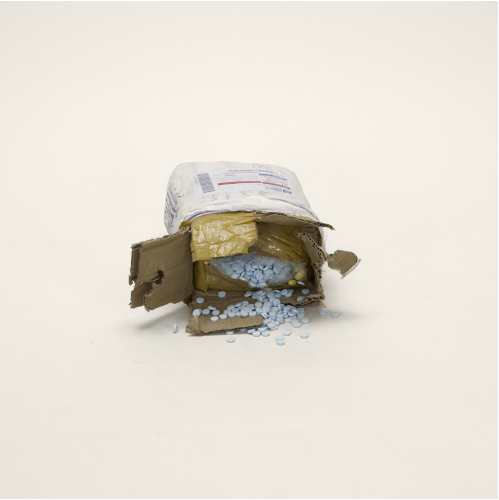Taryn Simon
Having detailed victims of miscarriages of justice, and the hidden, often clandestine side to America in her two previous major projects, Taryn Simon now turns her camera on a vast array of illegal and banned substances being brought into the USA on a daily basis. Over a five day period in November 2009 she tirelessly recorded all the items seized by the US Border Agency at John F. Kennedy airport in New York, cataloguing over 1000 different objects, which form her new series, Contraband. Her work is always powerful and succinct, but this new project is her most literal yet, and the images themselves are little more than an almost scientific record of these weird and sometimes mundane objects. “I wanted the shoot to be somewhat of a performance piece, where my photographs were replicating the actual flow of goods during a very fixed period of time,” says Simon. Using a neutral background and the same lighting set-up for every shot, the work is an exhaustive (and exhausting) record of merely a fraction of what people attempt to bring into the USA every month. Some of the items – heroin, fake handbags or a dead mammal – are obviously illegal, but its interesting to see other less obviously threatening or dangerous objects which the Borders Agency decided to confiscate.
Simon’s work has evolved in an interesting manner over the last decade, and there is little or no hint of her early fashion work to be found in profiles of her nowadays. Whilst this early work may perhaps detract from the serious subjects she now tackles, it was always interesting and often groundbreaking: for one infamous shoot in 2001 for The Fashion magazine (long defunct) she placed model Carmen Kass in a shark cage and photographed her underwater with tiger sharks circling the only semi-protected model.
Leaning more towards reportage and portraiture, particularly of prominent or interesting global political figures such as Fidel Castro or Henry Kissinger, Simon’s work moved away from the commercial realm but still utilised atmospheric, often cinematic, lighting set-ups. A commission from The New York Times into wrongly convicted prisoners who were subsequently freed from Death Row led her to explore photography’s role in the US criminal justice system, and the resulting series The Innocents is an amazing and justly lauded body of work, which combined sympathetic documentary work with a real, stylised artistic sensibility.
This was followed by An American Index Of The Hidden And Unfamiliar, where she gained access to many secretive and private locations throughout America, documenting a diverse dark side of the country, including endangered species in captivity, cryogenic storage facilities and missile testing sites. Simon has become the de facto chronicler of much that goes on behind closed doors in the USA today, and Contraband, whilst not as aesthetically interesting as her two previous series, explores this grey area further.
By Field of Vison


